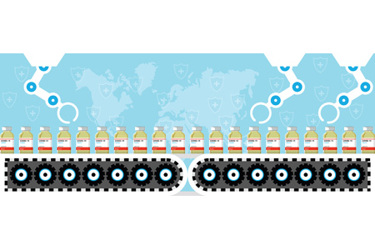Big Bio: Inside SILS' New Stake In Biocon

By Matthew Pillar, Editor, Bioprocess Online

Historically, vaccines haven’t been an element of Biocon’s $70 billion biosimilar and novel biologics portfolios.
Over at Serum Institute Life Sciences (SILS), biosimilars and novel biologics haven’t historically been an element of its core billion-dollar vaccine portfolio.
But the COVID-19 forecast is calling for an endemic, the U.S. federal government is calling for mandated COVID-19 vaccines and expanding demographic eligibility, and a first round of booster shots is already underway. From development to distribution, the fed is footing big—and mounting—biopharma bills. The Biomedical Advanced Research and Development Authority’s Public Health and Social Services Emergency Fund alone allocates more than $50 billion for the development, manufacture, and purchase of COVID-19 vaccines and related supplies through 2024. That doesn’t include the tens of billions being shelled out by the FDA, NIH, DOD, and others. And that’s just here in the States.
Amid the tragic consequences of COVID-19, vaccines are once again a big, sexy, federally-funded business—one Biocon and SILS are locking arms to engage.
Box Scores Of The Big Biopharma Deal
There’s no guesswork involved in deciphering the intent behind the announcement of an alliance between SILS, one of the largest producers of the Covishield vaccine, and Biocon. The latter gets in on the red-hot and largely government funded vaccine business via access to 100 million doses of SILS-produced vaccines per year for 15 years beginning in 2023, and commercialization rights to the SILS vaccine portfolio for global markets. In return, SILS gets about a 15% stake in Biocon, valued just south of $5 billion. Biocon’s commercialization rights will effectively take 1,500,000,000 doses of product to market.
Those aren’t all necessarily COVID-19 vaccines, mind you, so it’s too soon to project Biocon’s ROI. In broad numbers, the purchase price of vaccines can range from about ten U.S. dollars per dose to around $250 per dose, depending on the formulation and the buyer, as price tags vary considerably between government and private sector buyers. On either end of that spectrum, the math reveals an incredibly smart investment and mindboggling returns for Biocon.
But there’s more to the deal than a new vaccine distributorship.
Biocon Plants Flag In Vaccines
Biocon’s end of the deal reaches beyond distribution of product manufactured at SILS’ soon-to-be-online vaccine facility in Pune, India. The company is putting additional chips on the vaccine development table, having announced that it will establish, at its cost, a vaccine research and development division to support the SILS alliance. It will also make its cell culture and sterile fill/finish capabilities available to SILS.
SILS Looks Beyond Its Core Competency
Under the terms of the alliance, Biocon and SILS are also making plans for service level agreements for collaborative manufacturing and distribution of antibodies targeting infectious diseases like Dengue, HIV, and more. That’s a departure for vaccine-centric SILS.
Adar Poonawalla, CEO of SILS parent company Serum Institute of India, says the complementary prophylactic/therapeutic nature of the vaccine/antibody alliance ultimately aims to address inequitable access to both companies’ core products in emerging and developed markets.
The alliance paves the way for further crossover and collaboration between the two major vaccine and antibody manufacturers, and I suspect a steady stream of news forthcoming detailing the collaboration’s efforts. Ultimately, the alliance is exemplary of a trend to watch as big biopharma reorganizes on COVID-19 learnings and in preparation for the next viral outbreak. The battle to prevent and treat infectious diseases is fought on the backs of antibodies and vaccines, and we expect the lines between those distinct businesses of biotech to continue blurring.
